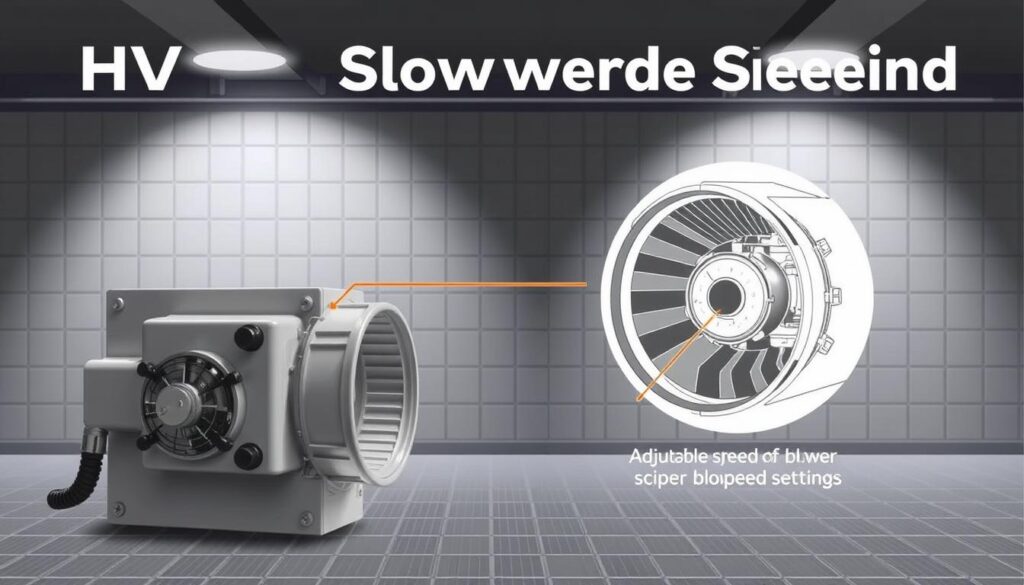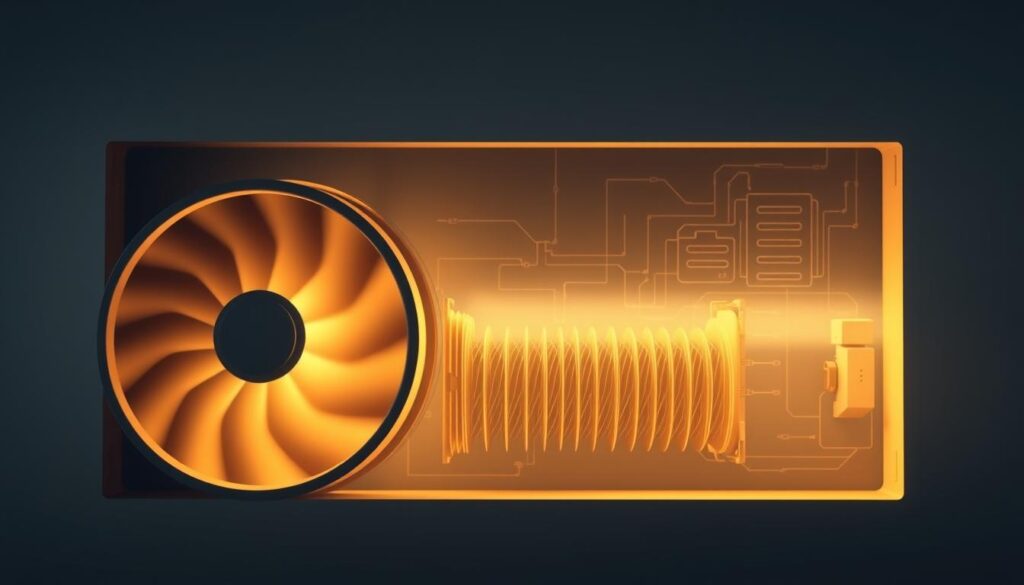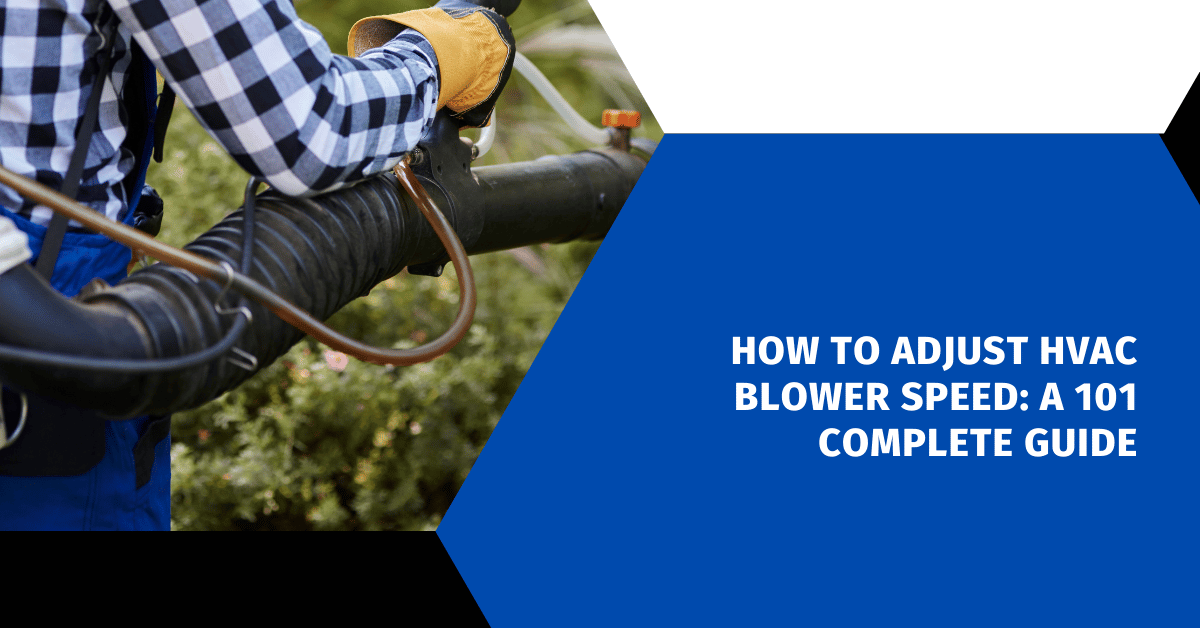Affiliate Disclosure
HVAC Guide Guys is a participant in the Amazon Services LLC Associates Program, an affiliate advertising program designed to provide a means for sites to earn advertising fees by advertising and linking to Amazon.
How to Adjust HVAC Blower Speed? Are you tired of uneven heating and cooling in your home? What if adjusting your HVAC blower speed could be the secret to perfect indoor comfort?

Learning how to adjust HVAC blower speed is key for homeowners. It can make your heating and cooling systems work better. Adjusting the furnace fan speed can greatly improve your home’s temperature, energy use, and comfort.
Your HVAC system’s performance relies on the right blower speed settings. By knowing and using the right techniques, you can make your home more comfortable. You might also save on energy costs.
Key Takeaways
- Blower speed directly impacts home comfort and energy efficiency
- Proper adjustment requires understanding your specific HVAC system
- Professional guidance can help prevent potential system damage
- Regular maintenance enhances HVAC performance
- Correct blower speed can reduce energy consumption
Table of Contents
Understanding Your HVAC Blower System
Your home’s comfort relies on a key part of your HVAC system: the blower motor. Learning how to change the air handler motor speed can greatly improve your home’s temperature and energy use.
HVAC blower motor settings are vital for good indoor air quality and comfort. Different motors offer unique features that can change how your home heats and cools.
Types of Blower Motors
There are three main types of blower motors:
- Single-speed motors: Work at one speed, offering basic air flow
- Multi-speed motors: Let you adjust airflow for more flexibility
- Variable-speed motors: Control airflow precisely for the best efficiency
Key System Components
To understand your blower system, you need to know its main parts:
- Blower wheel
- Motor assembly
- Electrical connections
- Fan housing
Impact on Home Comfort
The right hvac blower motor settings can really make a difference in your home. For example, variable-speed motors can cut energy use by up to 75% compared to old motors. They also help keep the temperature more even.
Selecting the right blower motor is not just about temperature—it’s about making your home comfortable and energy-efficient.
Explore Our HVAC Shop
Looking for top-rated HVAC tools, parts, and accessories? Visit our shop and find the perfect solution for your needs.
Visit the ShopBenefits of Proper Blower Speed Adjustment
Adjusting your HVAC system’s blower speed can change your home’s comfort and efficiency. Increasing the ac blower cfm brings many benefits beyond just controlling temperature.
Proper blower speed adjustment offers many benefits for homeowners:
- Enhanced Energy Efficiency: Managing airflow well can cut down energy use and lower bills
- Improved Indoor Air Quality: The right blower speeds make air filtering and circulation better
- More even room temperatures across your home
- Less wear and tear on HVAC parts
Decreasing furnace blower rpm leads to better airflow balance. This avoids extra stress on your heating and cooling system. It also stops hot or cold spots, keeping every room comfy.
Homeowners gain several key benefits from proper blower speed management:
- Up to 20% less in energy costs
- A longer life for your HVAC system
- A quieter system
- More accurate temperature control
By knowing and using these adjustments, you can make your home more comfortable and efficient. You’ll also protect your HVAC investment.
How to Adjust HVAC Blower Speed
Adjusting your HVAC blower speed needs attention and a clear plan. Proper control can make your home more comfortable and save energy. Knowing how to adjust your blower motor will improve your system’s performance.
Safety Precautions
Always put safety first when working with HVAC systems. Here are some key safety tips:
- Turn off power to the HVAC system at the circuit breaker
- Wear protective gloves and safety glasses
- Ensure proper ventilation in the work area
- Avoid working alone if possible
Required Tools and Equipment
Get these tools ready before you begin:
- Multimeter
- Screwdriver set
- Manufacturer’s manual
- Voltage tester
- Work gloves
Step-by-Step Adjustment Process
Here’s how to adjust your HVAC blower speed:
- Locate the blower motor control panel
- Consult your system’s manual for specific adjustment instructions
- Calculate the required Cubic Feet per Minute (CFM) for optimal airflow
- Carefully adjust the motor speed settings
- Test the system after making adjustments
Pro Tip: When in doubt, always consult a professional HVAC technician to ensure proper ecm motor speed control and psc blower motor adjustment.
Being precise is crucial when adjusting your HVAC blower speed. Take your time, follow each step carefully, and always prioritize safety.
Explore Our HVAC Shop
Looking for top-rated HVAC tools, parts, and accessories? Visit our shop and find the perfect solution for your needs.
Visit the ShopCalculating Optimal Airflow Requirements

Knowing how to find the right airflow for your HVAC system is key. It helps your system work well. To boost your ac blower’s cfm, you need to know the airflow your home needs.
Experts say to start with 400 CFM (cubic feet per minute) per ton of cooling. This means you must adjust your hvac blower settings to fit your system’s size and cooling needs.
- For a one-ton system: Aim for 400 CFM
- For a two-ton system: Target 800 CFM
- For a three-ton system: Seek 1,200 CFM
But calculating airflow isn’t just about numbers. You also need to think about:
- Home square footage
- Ceiling height
- Insulation quality
- Local climate conditions
Proper airflow ensures your HVAC system operates at peak efficiency, reducing energy consumption and extending equipment lifespan.
To find your current airflow, you might need special tools or a pro’s help. An HVAC technician can measure and adjust your system’s CFM. This ensures your system works best and keeps you comfortable.
Professional vs DIY Blower Speed Adjustment
Adjusting the furnace fan speed can be tough for homeowners. Some small tweaks can be done by yourself. But, changing the air handler motor speed often needs special skills.
Choosing between hiring a pro or doing it yourself depends on several key factors. These factors affect your home’s comfort and how well the system works.
When to Call a Professional
There are times when you really need a pro:
- Complex variable-speed motor systems
- Electrical wiring changes
- Advanced diagnostic needs
- Warranty concerns
Cost Considerations
Professional services might seem pricey at first. But, they can save you money in the long run. Getting a pro to adjust your furnace fan speed can lead to:
- Improved energy use
- Lower utility bills
- A longer-lasting system
- Avoiding expensive repairs later
Safety Risks
Trying to change the air handler motor speed yourself can be risky. You might face:
- Electrical dangers
- Damage to the system
- Voiding the warranty
- Risk of injury
Professionals have the right tools, knowledge, and experience. They can safely adjust the blower speed and keep your system running well.
Getting professional HVAC help can save you money and make sure your home’s comfort system works best.
Seasonal Considerations for Blower Speed
Your home’s comfort depends on understanding variable speed HVAC settings throughout different seasons. Air conditioner fan speed modification becomes crucial as temperatures and humidity levels fluctuate.
In winter, your HVAC system needs different blower speed settings than in summer. Low humidity and colder temperatures require strategic air circulation to keep warmth consistent.
- Winter settings typically require slower blower speeds to distribute heat evenly
- Summer settings need higher fan speeds for efficient cooling and moisture control
- Shoulder seasons demand more flexible variable speed hvac settings
Humidity is key in determining the best blower speed. In humid summer conditions, slower fan speeds can help remove moisture more effectively. On the other hand, dry winter environments might benefit from carefully adjusted airflow to prevent excessive dryness.
Smart air conditioner fan speed modification strategies can help you:
- Reduce energy consumption
- Improve overall home comfort
- Minimize temperature fluctuations
- Extend HVAC system lifespan
Pro tip: Consider investing in a smart thermostat that automatically adjusts blower speeds based on seasonal requirements.
Explore Our HVAC Shop
Looking for top-rated HVAC tools, parts, and accessories? Visit our shop and find the perfect solution for your needs.
Visit the ShopCommon Issues and Troubleshooting
Homeowners often face challenges with hvac blower motor settings. These issues can affect home comfort and system performance. Knowing these problems helps you fix them fast and well.
Your HVAC system’s performance relies on many factors. This includes proper ecm motor speed control and regular maintenance. Spotting common problems can save you time, money, and stress.
Airflow Problems
Airflow issues can really mess up your home’s comfort. Look out for these signs:
- Weak air circulation from vents
- Uneven temperature distribution
- Reduced air pressure
Noise Issues
Strange sounds from your HVAC system might mean there’s a problem:
- Rattling: Loose parts
- Squealing: Belt or bearing issues
- Grinding: Motor bearing problems
Performance Concerns
Performance drops can come from many factors affecting your blower motor’s efficiency:
- Inconsistent heating or cooling
- Frequent system cycling
- Increased energy consumption
If you keep having trouble with your hvac blower motor settings, get help from a pro HVAC technician. They can give you a detailed diagnosis and fix the problem.
Energy Efficiency and Cost Savings

Optimizing your HVAC system’s blower speed can save a lot of energy at home. By adjusting the variable speed settings, you can cut down your energy use. This leads to lower utility bills.
Lowering the furnace blower rpm makes your heating and cooling system more efficient. The main advantages are:
- Less electricity used
- Even indoor temperature
- Lower energy bills each month
- Longer life for your HVAC system
Modern HVAC systems with advanced variable speed tech are super efficient. They adjust airflow to match your home’s exact needs.
Getting a variable-speed blower can cut your yearly energy costs by 20-30%.
Your energy savings depend on a few things. These include your system’s age, your local climate, and your home’s insulation. HVAC experts can estimate your savings based on your situation.
Think about getting a smart thermostat and a variable-speed blower for better energy use. These tools work together to keep your home comfy while saving energy.
Explore Our HVAC Shop
Looking for top-rated HVAC tools, parts, and accessories? Visit our shop and find the perfect solution for your needs.
Visit the ShopAdvanced Blower Speed Control Systems
Modern HVAC systems have changed how we enjoy home comfort. They use advanced ecm motor speed control technologies. Now, your heating and cooling can be tailored to your exact needs with variable speed hvac settings.
Smart thermostats and advanced control systems bring unmatched precision to managing your home’s climate. They can adjust blower speeds automatically based on temperature and humidity levels.
- ECM motors provide energy-efficient performance
- Digital interfaces allow precise speed adjustments
- Zoned systems enable room-specific temperature control
New HVAC technologies use advanced sensors and algorithms to improve airflow. These systems can:
- Detect occupancy patterns
- Analyze indoor air quality
- Minimize energy consumption
| Control System | Energy Efficiency | Comfort Level |
|---|---|---|
| Traditional Single-Speed | Low | Standard |
| Variable Speed ECM | High | Customizable |
| Smart Zoned System | Very High | Personalized |
Future HVAC technologies will focus on predictive maintenance and machine learning algorithms. They aim to make your home even more comfortable and energy-efficient.
Conclusion
Learning how to adjust your HVAC blower speed can greatly improve your home’s comfort and save on energy. It lets homeowners control their indoor climate and cut down on utility bills.
Your HVAC system is a big investment. Making smart blower speed changes can make it last longer. By watching airflow and making the right changes, you can get better performance and less wear on parts.
While DIY efforts can be helpful, know your limits. HVAC pros have the tools and knowledge for precise adjustments. They’re especially important for complex systems or ongoing issues.
Keeping your home comfortable is all about proactive maintenance and smart tweaks. Whether you do it yourself or get help from a pro, knowing about blower speed helps you make better choices for your heating and cooling.

